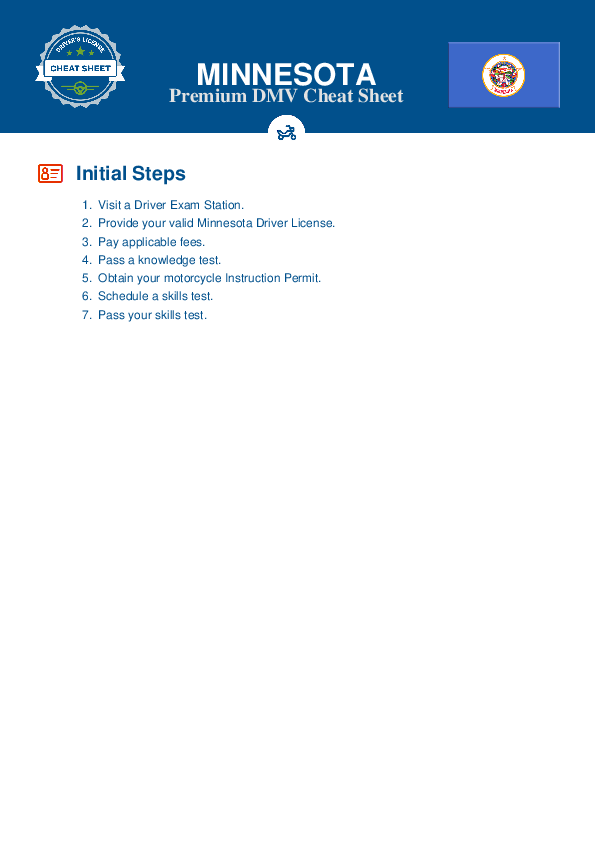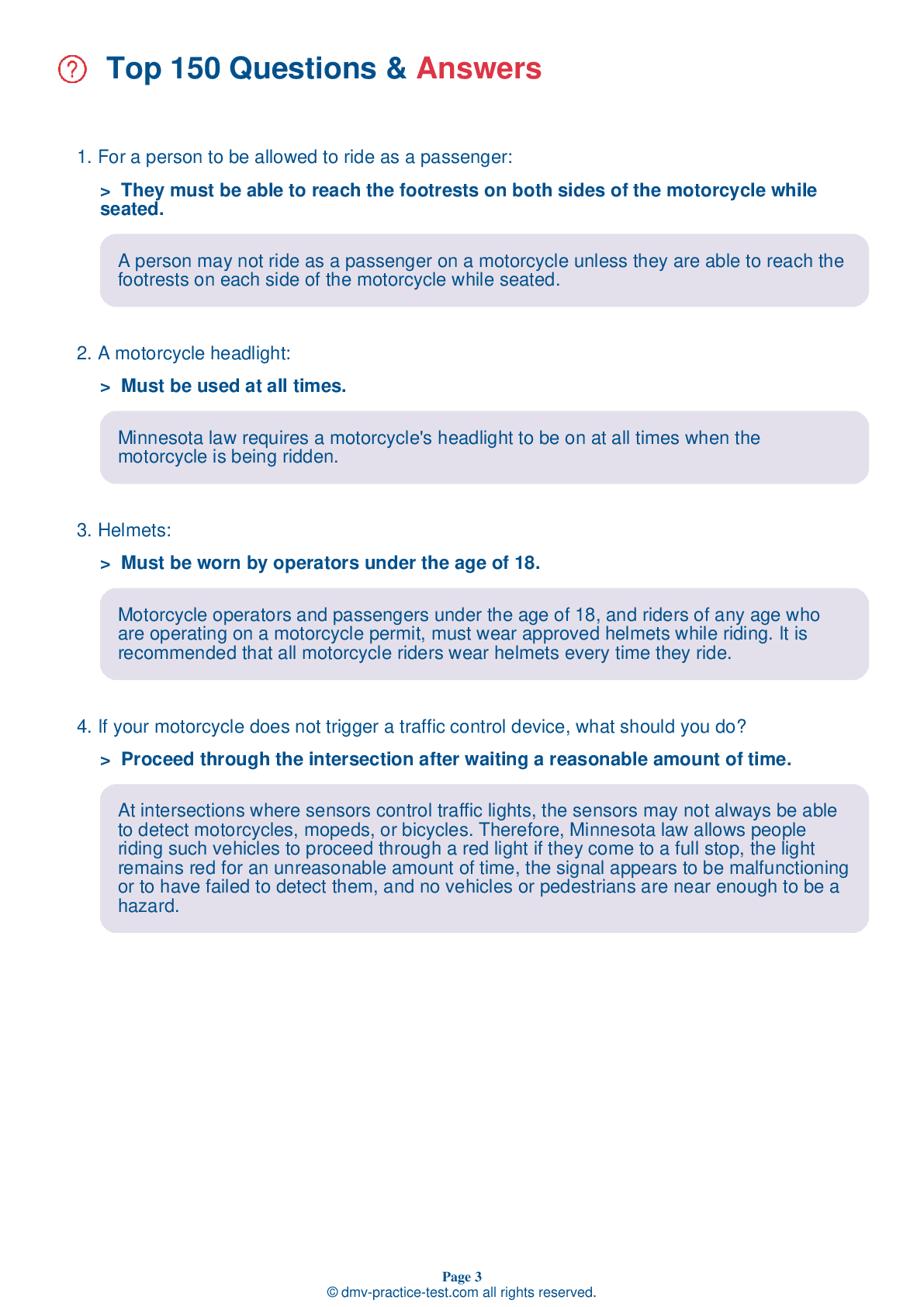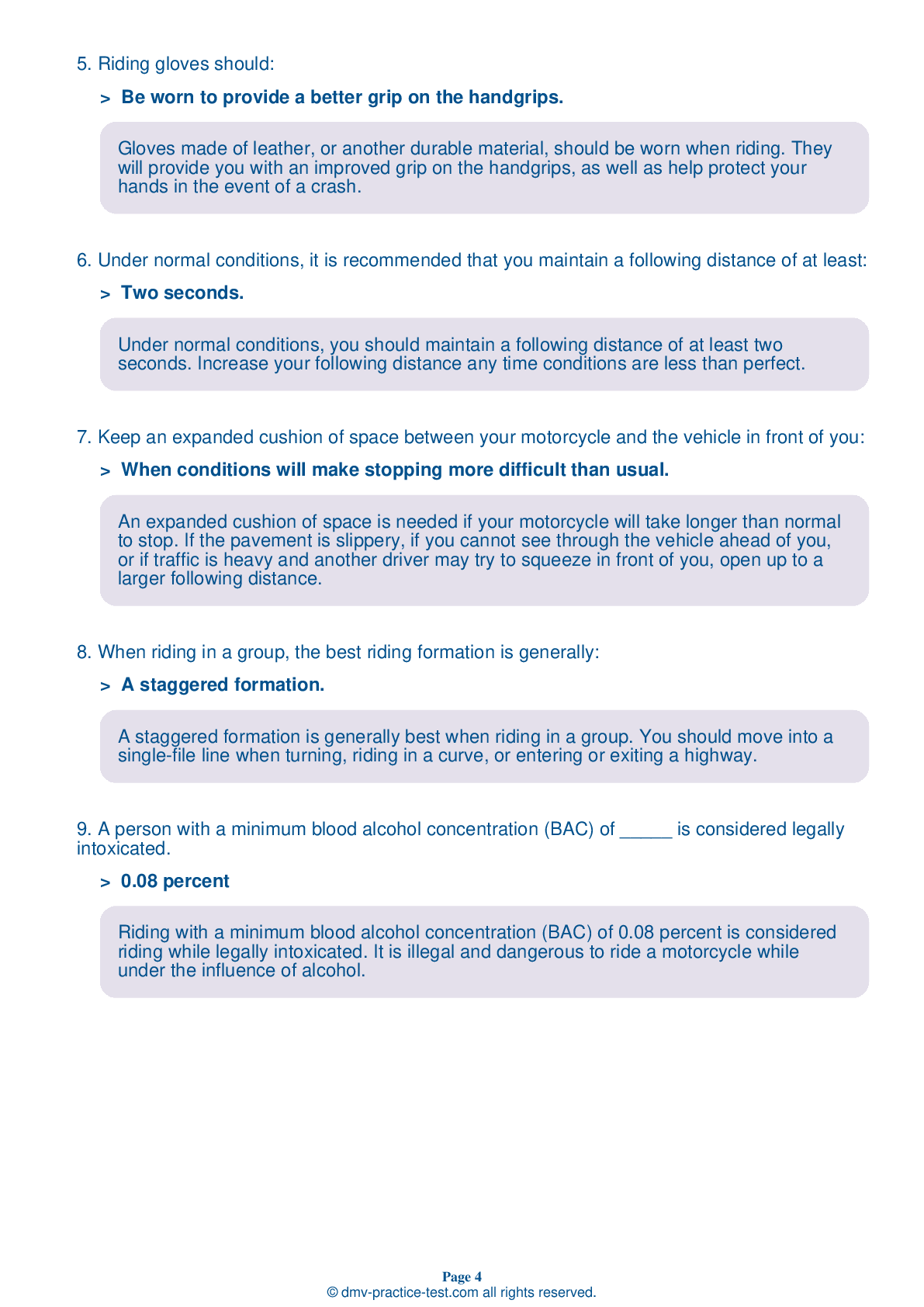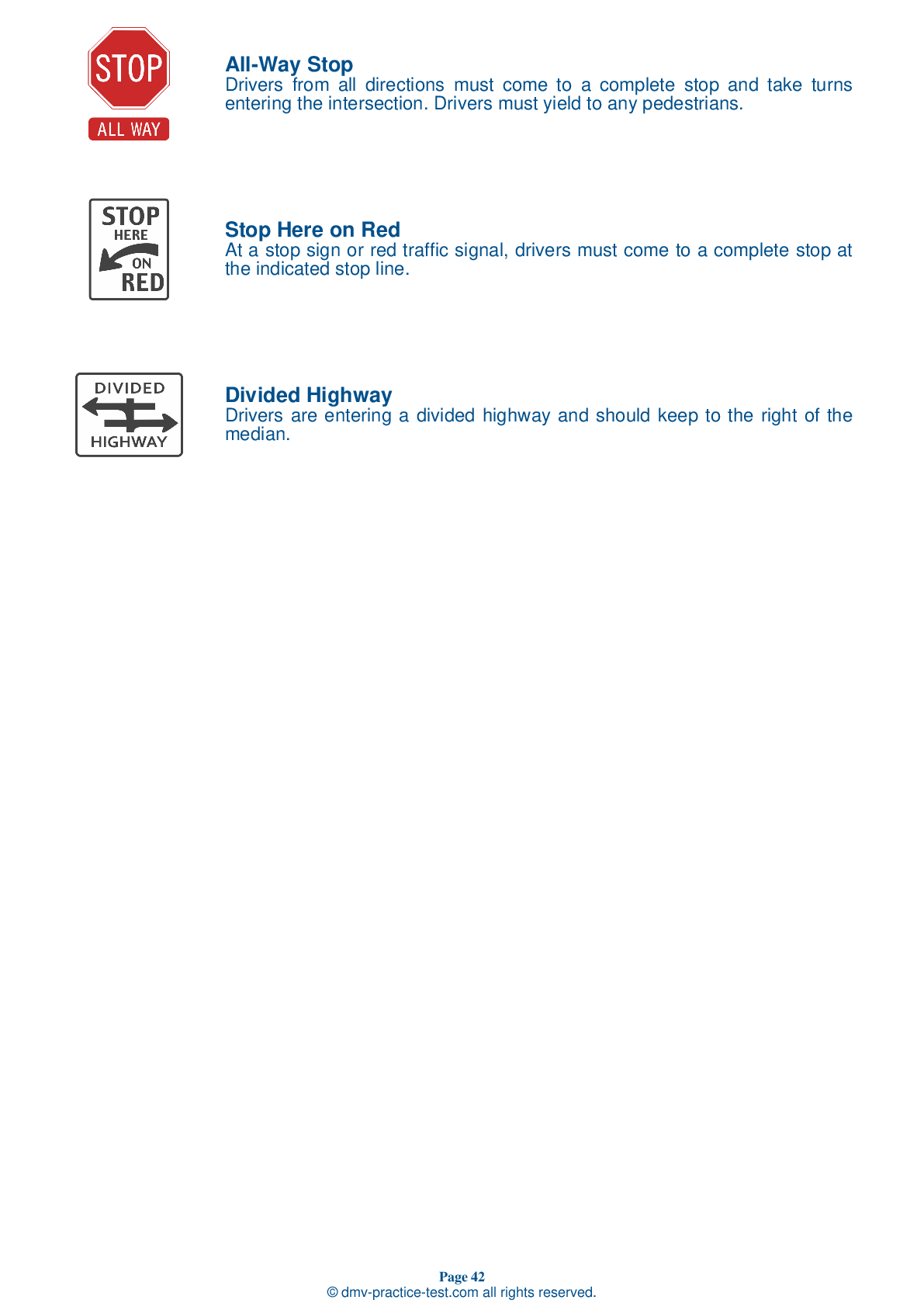DMV Permit Test #13
Motorcycle Test | License MN 2026 | FREE Online Practice! #13
Take this FREE motorcycle test (license in MN 2026) to check your knowledge of the road rules. To improve your results, download a motorcycle handbook online, study theory, and practice for free on our website. Still worried about how to get a motorcycle license in Minnesota in 2026? Check our website for more sample tests, train as much as possible, and boost your grades!
40
32
16
1 . To best control a motorcycle, a rider should:
Keep their feet firmly on the footrests.
When riding, sit so that you can use your arms to control the motorcycle rather than to hold yourself up. Your arms should be slightly bent when you hold the handgrips. To help maintain your balance, keep your knees against the gas tank and your feet firmly on the footrests.
2 . This sign means:
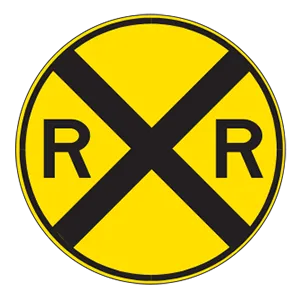
Playground ahead.
Circular traffic signs indicate upcoming railroad crossings. This sign tells drivers that they are approaching a railroad crossing and should be looking for signs of an oncoming train.
3 . Riding directly alongside another vehicle:
Should only be done during the day.
Avoid riding directly alongside another vehicle, since this may place you in the vehicle's blind spot. If the driver can't see you, they may enter your lane without warning. Riding alongside a vehicle is also dangerous because the vehicle will block your route of escape if a hazard arises.
4 . Making eye contact with another driver:
May make the driver mad.
Never rely on eye contact as an assurance that a driver will properly yield to you. It is common for drivers to look directly at motorcyclists and still fail to notice them.
5 . This road sign means:
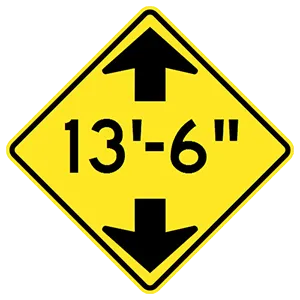
Two lanes of traffic moving in opposite directions are about to merge.
This sign warns that the overpass ahead has a low clearance. Do not proceed if your vehicle is taller than the height indicated (in this case, 13 feet, 6 inches).
6 . A helmet will not provide the best possible protection:
If it has cracks.
A helmet should meet U.S. Department of Transportation (DOT) and state standards and fit snugly all the way around to provide maximum protection. It should be free of defects such as cracks, loose padding, or frayed straps.
7 . When preparing to pass a vehicle on the left, it is important to ride on the left side of your lane because:
It will place you in the rearview mirror of the car in front of you.
When preparing to pass on the left, you should ride in the left portion of your lane. This lane position will increase your line of sight and make your more visible to oncoming traffic.
8 . When passing a row of parked cars to your right when there is no oncoming traffic to your left, you should:
Use your rearview mirrors more frequently than usual.
When passing a row of parked cars, it is generally best to stay on the side of your lane that is not directly next to the cars. This will help to protect you from potential hazards like car doors being opened or people stepping out from between the cars. If there is traffic coming from the opposite direction, it is a good idea to stay in the center portion of the lane.
2026 Minnesota | Frequently Asked Questions
To acquire a motorcycle driver's license in Minnesota, you must first obtain a motorcycle instruction permit. This requires passing a written exam. After gaining experience, you can apply for a motorcycle endorsement on your driver's license. This involves passing both a skills test and an on-road test. You must also pay the necessary fees.
In Minnesota, the minimum age to obtain a motorcycle permit is 16 years old. However, if you're under 18, you must also have a valid driver's license, complete a state-approved motorcycle safety course, and hold your motorcycle instruction permit for at least six months before you can get a motorcycle endorsement on your license.
Yes, you do. In Minnesota, a dedicated motorcycle endorsement is required to legally operate a motorcycle. This endorsement can be added to your existing driver's license after passing a written test and a road test. If you are a new rider, you may also need to complete a state-approved motorcycle safety course.
To apply for a motorcycle driver's license in Minnesota, you'll need several documents: proof of identity (like a birth certificate or passport), your Social Security number, proof of residency in Minnesota, and if applicable, your current driver's license. If you're under 18, you'll also need a parent or guardian's signature on your application form.
Yes, you will need to take a written exam to get a motorcycle license in Minnesota. This test ensures you understand the rules of the road, safe riding practices, and Minnesota's specific motorcycle laws. If you successfully complete a state-approved motorcycle safety course, the riding skills test can be waived, but the written exam is still required.
The written test for a motorcycle license in Minnesota covers a variety of subjects related to motorcycle operation and safety. Topics include traffic laws, road signs, safe riding techniques, handling dangerous situations, and understanding motorcycle equipment. The test is designed to ensure riders are knowledgeable about the rules of the road and can operate a motorcycle safely.
In Minnesota, completion of a state-approved motorcycle safety course can waive the written and skills test required for a motorcycle endorsement. The course includes classroom instruction and hands-on riding exercises. Upon successful completion, you'll receive a certificate which you can present at the DMV to obtain your endorsement, bypassing the standard tests.
Enrolling in a motorcycle training course in Minnesota involves finding a state-approved training school, signing up for a suitable course, and paying the necessary fees. Courses typically include classroom instruction and hands-on riding practice. After completing the course, you will receive a certificate which can be used to waive the skills test when applying for a motorcycle endorsement.
No, you don't need to own a motorcycle to take the license test in Minnesota. You can use any street-legal, insured motorcycle that you're comfortable operating. However, it must meet all safety standards and be appropriately sized for you. The key is to ensure you're familiar with the motorcycle's operation before taking the test.
Yes, you can use a friend's motorcycle for the Minnesota motorcycle license road test, provided the motorcycle is legally registered, insured, and passes a basic safety inspection. Remember, you must also have a valid motorcycle permit to legally ride the motorcycle to the testing location.
Yes, in Minnesota, the motorcycle skills test evaluates your ability to handle a motorcycle, including starting, accelerating, turning and braking. It also assesses your ability to handle hazardous situations such as swerving and quick stops. The test ensures you can safely operate a motorcycle under various traffic conditions.
Yes, in Minnesota, new motorcycle drivers under the age of 18 must first obtain a motorcycle instruction permit. This permit carries several restrictions: they cannot ride at night, carry passengers, or ride on interstates. After a minimum of six months and reaching 17 years of age, they can apply for a full endorsement.
Yes, your Minnesota motorcycle license is valid across the United States. It's recognized by all states under the Full Faith and Credit Clause of the U.S. Constitution. However, when riding out of state, you must abide by the traffic and motorcycle laws of that particular state, which may differ from Minnesota's.
In Minnesota, motorcycle helmet laws are partial, meaning they apply to certain riders. All riders under the age of 18 and those with a learner's permit, regardless of age, must wear a helmet. For those 18 and older with a full license, wearing a helmet is optional but highly recommended for safety.
In Minnesota, there are two types of motorcycle licenses: the motorcycle endorsement and the motorcycle-only license. The motorcycle endorsement can be added to a regular driver's license, while the motorcycle-only license is for those who only want to operate motorcycles. Both require a knowledge test, skills test, and vision screening.
Yes, you can add supplementary endorsements to your motorcycle license in Minnesota. These might include a school bus endorsement or a commercial vehicle endorsement. Each endorsement requires passing additional written and skills tests. Always check with the Minnesota Department of Public Safety for specific requirements.
Yes, the motorcycle license test in Minnesota is available in several languages other than English. These include Spanish, Hmong, Vietnamese, Russian, and Somali. If you need the test in a language that isn't provided, you can request an oral test or use an interpreter.
An effective strategy to prepare for the Minnesota motorcycle license test is to study the state's Motorcycle and Motorized Bicycle Manual thoroughly. The manual covers all the information needed for the test. Additionally, taking practice tests available online can also be beneficial as they help familiarize you with the format and type of questions on the actual test.
Yes, the motorcycle written exam in Minnesota is available in several languages other than English. These include Spanish, Hmong, Vietnamese, Russian, and Somali. If you need the test in a language that is not provided, you can request an oral test or use an interpreter.
If you fail the motorcycle written test in Minnesota, you are allowed to retake it. However, you must wait until the next day to do so. There is no limit to the number of times you can retake the test, but each attempt will require a new fee. It's advisable to study thoroughly before reattempting.
